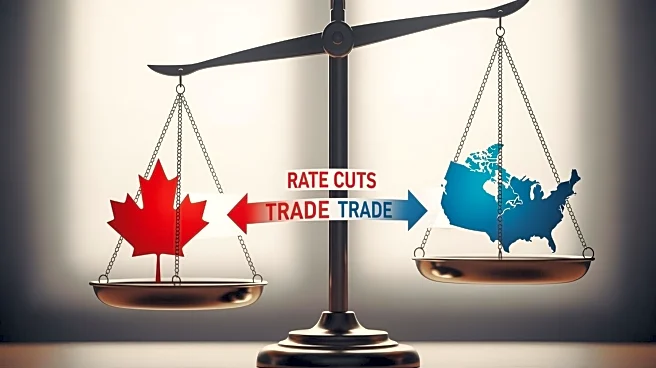What's Happening?
The Bank of Canada is expected to announce a reduction in its policy rate to 2.25% this week, marking a second consecutive rate cut. This decision is driven by a slowing Canadian economy and high unemployment
rates, exacerbated by U.S. tariffs on Canadian imports such as steel, autos, and lumber. These tariffs have significantly reduced demand and employment levels in Canada. The anticipated rate cut is seen as a response to these economic challenges, with a majority of economists predicting a 25-basis-point reduction. The Bank of Canada aims to maintain inflation within its target range of 1% to 3%, although recent data shows inflation slightly above this range. The decision is expected to be announced on October 29, alongside the release of the quarterly Monetary Policy Report.
Why It's Important?
The Bank of Canada's decision to cut rates is significant for both Canadian and U.S. economic relations. The U.S. tariffs have directly impacted Canadian industries, leading to economic contraction and job losses. A rate cut could help stimulate the Canadian economy by making borrowing cheaper, potentially increasing consumer spending and business investment. However, the move also highlights the broader economic tensions between the U.S. and Canada, particularly in trade relations. For U.S. businesses, especially those involved in cross-border trade, the rate cut could mean changes in trade dynamics and pricing strategies. Additionally, the decision may influence U.S. monetary policy considerations, as the Federal Reserve monitors international economic conditions.
What's Next?
The Bank of Canada will announce its monetary policy decision on October 29, which will include the rate cut and the release of the Monetary Policy Report. This report will provide forecasts for the Canadian economy and inflation, offering insights into future economic conditions. Stakeholders, including businesses and policymakers, will be closely watching the announcement to gauge the potential impacts on trade and economic relations with the U.S. The decision may also prompt reactions from U.S. political and economic leaders, particularly in the context of ongoing trade negotiations and economic policy adjustments.









